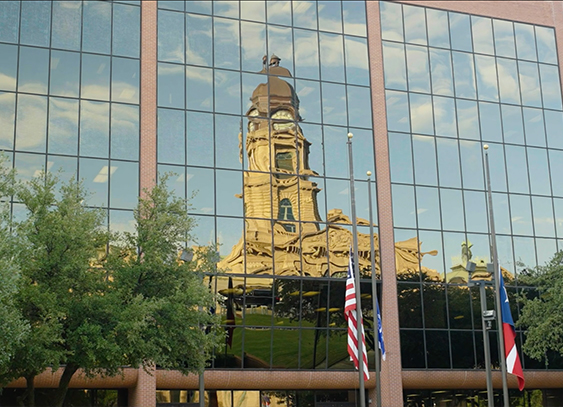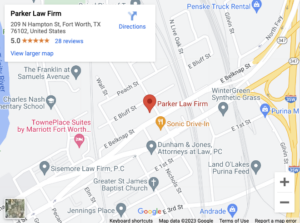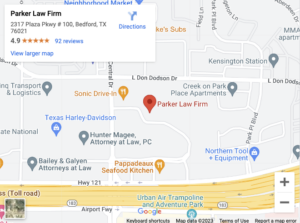Dram Shop Liability Claims: What Texas Victims Need to Know

When a family’s world is shattered by a drunk driver, the immediate aftermath is a storm of confusion, grief, and anger. The focus, naturally, falls on the individual who made the catastrophic choice to get behind the wheel. We see the flashing lights, the twisted metal, and the person in handcuffs, and we believe we have found the source of the tragedy. But what if that’s only half the story? What if the person who caused the crash was simply the final, tragic link in a longer chain of negligence a chain forged not in a moment of poor judgment, but in a corporate office where profit margins were prioritized over public safety? This is the unseen story behind far too many drunk driving tragedies in Texas, and it is at the heart of what we call dram shop liability.
At Parker Law Firm, we have spent over 35 years sitting with families in the quiet, devastating days after a collision. We’ve held their hands as they grappled with unimaginable loss and the terrifying financial uncertainty that follows. And in that time, we’ve learned a fundamental truth: your family’s recovery shouldn’t be limited by the drunk driver’s insurance policy. In fact, in most cases of serious injury or wrongful death, the intoxicated driver’s insurance policy is simply inadequate to cover the extent of harm caused. True justice and the financial security needed to rebuild a life are often found by holding the business that enabled the tragedy fully accountable. This isn’t a secondary legal action; for many Texas families, pursuing a dram shop claim is the primary path to rebuilding a shattered life.
The concept is straightforward. Dram shop liability refers to the laws that hold commercial establishments bars, restaurants, and liquor stores legally responsible for the devastating harm caused by patrons they over-served. It is a legal recognition that when a business profits from selling alcohol, it also accepts a profound responsibility to the community. When that responsibility is broken, the consequences are staggering. In 2022 alone, the National Highway Traffic Safety Administration reported that 13,524 people died in alcohol-related crashes. That isn’t just a statistic; it’s a map of shattered families, each one a universe of grief. Holding negligent establishments accountable is not just about compensating victims; it’s about demanding a higher standard of care to prevent future tragedies.
A System Designed to Protect Businesses: Understanding Texas Dram Shop Law
The legal framework governing bar owner liability in our state is the Texas Dram Shop Act. On its face, this law provides a clear cause of action for victims. It states that an alcohol provider can be held liable for damages if it was apparent to the provider that the individual being served was “obviously intoxicated to the extent that he presented a clear danger to himself and others,” and the intoxication of that person was a proximate cause of the damages suffered. This sounds like a powerful tool for justice, and when wielded by an experienced legal team, it is. However, the reality is that the system is not as straightforward as it seems. Over the years, powerful lobbying interests from the alcohol and hospitality industries have influenced Texas dram shop law, creating statutory hurdles designed to protect businesses over people.
The most significant of these hurdles is the concept of “safe harbor.” The dram shop safe harbor provisions can shield a bar or restaurant owner from liability, even if their employee negligently over-served a patron who went on to cause a fatal crash. To claim this protection, an establishment must show that it requires its employees to attend a Texas Alcoholic Beverage Commission (TABC)-approved seller-server training program, that the employee who over-served the patron actually attended this program, and that the employer did not directly or indirectly encourage the employee to violate the law.
This defense can sound insurmountable to a grieving family. It creates a legal shield that corporations can hide behind, pointing to training certificates and policy manuals while ignoring the on-the-ground reality of their business practices. This is where the fight for justice truly begins. An experienced dram shop attorney knows that these cases are won not by accepting corporate policy at face value, but by conducting a relentless investigation to pierce these defenses. We have seen cases where every server was certified, yet the internal culture of the bar, driven by sales goals and pressure from management, encouraged over-serving. We’ve uncovered surveillance footage that directly contradicts a bartender’s testimony. We know how to demonstrate that while a business may have checked the boxes for TABC compliance, its actual operations created an environment where a tragedy was not just possible, but inevitable. These are the details that turn a difficult case into a successful one, ensuring that a paper-thin defense doesn’t stand in the way of a family’s recovery.
The Tipping Point: How Overserving Becomes a Breach of Public Trust
The central question in any civil dram shop claim is whether the establishment continued to serve alcohol to someone who was already obviously intoxicated. This concept of overserving alcohol liability is not about penalizing a business for a single misjudgment; it’s about holding them accountable for a conscious decision to place profits ahead of human life. Obvious intoxication isn’t a subtle or ambiguous state. It’s marked by slurred speech, stumbling, aggressive or overly emotional behavior, and a clear loss of coordination. These are the universal signs that a person has had too much to drink and has become a danger to themselves and everyone around them.
A trained and responsible bartender or server recognizes these signs immediately. They know that the next drink they pour isn’t just a sale—it could be the catalyst for a head-on collision. They understand their legal and ethical duty to cut a patron off, to offer them water or food, and to arrange for a safe ride home. When they fail to do so, it is often because the establishment they work for has created a culture where the flow of alcohol, and the revenue it generates, is the only thing that matters. They are taught to upsell, to keep glasses full, and to ignore the warning signs that their training taught them to look for.
This breach of public trust is what makes a dram shop case so compelling. It’s the story of a business that was given a license and the community’s trust to sell a dangerous product responsibly, and they betrayed that trust for an extra few dollars on a bar tab. When we investigate these claims, we look beyond the single employee to the corporate policies and management practices that enabled their negligence. Was there adequate staffing? Were servers incentivized to sell more alcohol? Was there a manager on duty actively monitoring for signs of intoxication? The answers to these questions often reveal a systemic failure, transforming the narrative from one of an employee’s mistake to one of a corporation’s calculated risk—a risk they took with your family’s safety.
Building the Case for Justice: The Hunt for Critical Evidence
Successfully proving a dram shop claim requires much more than just the intoxicated driver’s blood alcohol content or the police report from the crash scene. It demands a deep, immediate, and strategic investigation into the hours and minutes leading up to the tragedy. This is because the most crucial evidence for dram shop liability is often fragile and can disappear within days, if not hours, of an incident. An experienced attorney understands that there is no time to waste. From the moment we take a case, we are in a race against time to preserve the evidence that will prove an establishment’s negligence.
The first step is often sending a spoliation letter, a legal notice demanding that the bar or restaurant preserve all relevant evidence. This includes everything from security camera footage, which can be a smoking gun, to credit card receipts, which can establish a timeline of how many drinks were purchased. We seek out employee schedules, shift logs, and internal communications. We look for the establishment’s policy manuals and training records, which are critical for challenging a safe harbor defense. Knowing how to prove overserving in Texas dram shop claims is about knowing what to look for and how to get it before it’s too late.
Witness testimony is another cornerstone of a strong claim. We work with investigators to identify and interview other patrons who were at the bar, employees who were working that night, and anyone else who observed the intoxicated person’s behavior. Their accounts can paint a vivid picture of the individual’s deteriorating state and the staff’s continued service. Did they see the person stumble on their way to the restroom? Did they hear them speaking loudly or arguing? Did they witness the bartender pour “one more for the road”? Each of these details helps build an irrefutable case that the staff knew, or should have known, that the patron was a clear danger. This meticulous collection of evidence is how we level the playing field against large corporations and their insurance companies, who will do everything in their power to deny responsibility.
Rebuilding a Life: The True Meaning of Damages in a Dram Shop Claim
When a family is reeling from a catastrophic injury or the loss of a loved one, the idea of placing a monetary value on their suffering can feel cold and clinical. But in our civil justice system, compensation—or damages—is the only tool we have to hold a negligent party accountable and provide a family with the resources they need to face an uncertain future. This is especially critical in cases of drunk driving bar liability, because as we’ve seen time and time again, the drunk driver’s auto insurance is almost never enough to cover the true cost of the harm they’ve caused.
The damages recoverable in a dram shop claim are meant to restore a family, as much as possible, to the position they were in before the tragedy. This goes far beyond just paying for the initial hospital bills. It includes compensation for a lifetime of future medical care, physical therapy, and assistive devices. It covers lost wages from being unable to work, as well as the loss of future earning capacity if a victim is permanently disabled. For a family who has lost a primary breadwinner, this financial support is the difference between stability and ruin.
But the most profound damages are often those that can’t be calculated on a spreadsheet. How do you quantify the physical pain and emotional anguish a person endures every day? What is the value of a parent’s guidance and companionship, or a spouse’s love and support, that has been stolen from a family forever? These are known as non-economic damages, and they are a vital component of a claim. They are a legal acknowledgment of the immense human cost of corporate negligence. Pursuing these damages is not about punishing a business; it’s about securing a family’s future and providing them with the peace of mind that comes from knowing they will be cared for, no matter what challenges lie ahead.
A Ticking Clock on Accountability: Navigating the Statute of Limitations
In the wake of a devastating accident, navigating the legal system is often the last thing a family wants to think about. The focus is on healing, grieving, and simply getting through the day. However, it is crucial to understand that the law imposes strict deadlines on your right to seek justice. In Texas, the Texas dram shop statute of limitations for personal injury and wrongful death claims is generally two years from the date of the incident. If you fail to file a lawsuit within that time frame, you lose your right to recover compensation forever, no matter how strong your case is.
While two years may sound like a long time, it can pass in the blink of an eye when you are dealing with medical treatments, financial pressures, and emotional recovery. More importantly, the most critical work in a dram shop case happens in the first few weeks and months. As we discussed, evidence like surveillance video is often recorded over, witnesses’ memories fade, and employee turnover can make key individuals impossible to find. Delaying legal action not only risks missing the filing deadline but can also severely weaken your ability to build a powerful case.
Contacting an attorney promptly does not mean you will be immediately thrust into a contentious lawsuit. It means you will have an advocate on your side who can take the necessary steps to protect your rights and preserve the evidence while you focus on your family. An experienced lawyer will manage all the deadlines, handle communications with insurance companies, and begin the painstaking process of investigation. This proactive approach ensures that when the time is right, you will be in the strongest possible position to demand the full and fair accountability your family deserves.
Why Your Choice of Attorney is the Most Critical Decision You’ll Make
Not all personal injury attorneys are equipped to handle the unique complexities of a dram shop case. These are not simple car accident claims. They involve navigating a complex web of statutory law, fighting well-funded corporate defendants, and uncovering evidence that those defendants will go to great lengths to conceal. When you are facing this kind of battle, you need more than just a lawyer; you need a relentless advocate with a proven track record of fighting and winning these specific types of cases. You need a team that the other side knows is prepared to go to trial.
When considering an attorney, ask them about their specific experience with dram shop liability claims. Ask them to walk you through their investigative process. How do they work to defeat a safe harbor defense? What experts do they consult to establish the link between a bar’s negligence and the subsequent crash? The answers to these questions will reveal their level of expertise and their readiness to fight for you. At Parker Law Firm, we are honored that our dedication to these cases has been recognized by organizations like Mothers Against Drunk Driving (MADD), which recommends our firm to victims in North Texas. This is a reflection of our deep commitment to this cause and our unwavering focus on helping families put their lives back together.
Dispelling the Myths That Can Sabotage Your Claim
There is a great deal of misinformation surrounding these cases—myths often perpetuated by the very industries that benefit from them. One common myth is that the drunk driver is the only person at fault. As we’ve seen, the law clearly recognizes that liability can and should extend to the establishment that over-served them. Another is that a passenger who willingly rode with a drunk driver has no rights. This is also false; passengers can often recover damages, especially if they were unaware of the extent of the driver’s intoxication. Believing these myths can prevent a family from exploring the one avenue that could provide for their future. The most important thing you can do is speak with an experienced attorney who can provide you with the truth about your rights and options.
The Parker Law Firm Difference: A Relentless Pursuit of Full Accountability
For more than three decades, our firm has been dedicated to a single mission: providing compassionate, assertive, and results-oriented representation for injury victims. We are the attorneys you want but hope you never need. We understand that when you come to us, your life has been turned upside down. You are hurt, you are scared, and you are looking for a guide to help you through the darkest of times. We treat our clients like family because we know that behind every case file is a human story of loss, resilience, and the hope for a brighter future.
We believe that pursuing a dram shop claim is about more than just one case. It is about sending a clear message to the entire hospitality industry that a community’s safety is not for sale. It is about forcing businesses to adopt responsible serving practices that can prevent the next tragedy from happening. It’s about fighting the giants in court and ensuring that the scales of justice are balanced in favor of the victim, not the corporation.
If your life has been impacted by a drunk driving accident, you don’t have to face this alone. We are here to listen, to understand, and to fight tirelessly for you. Contact Parker Law Firm today for a free, confidential consultation. We will answer your questions, explain your rights, and help you understand the path forward. There is no fee unless we win, so you have nothing to lose and everything to gain by getting the help you need. Let us be your champions in the fight for justice.


